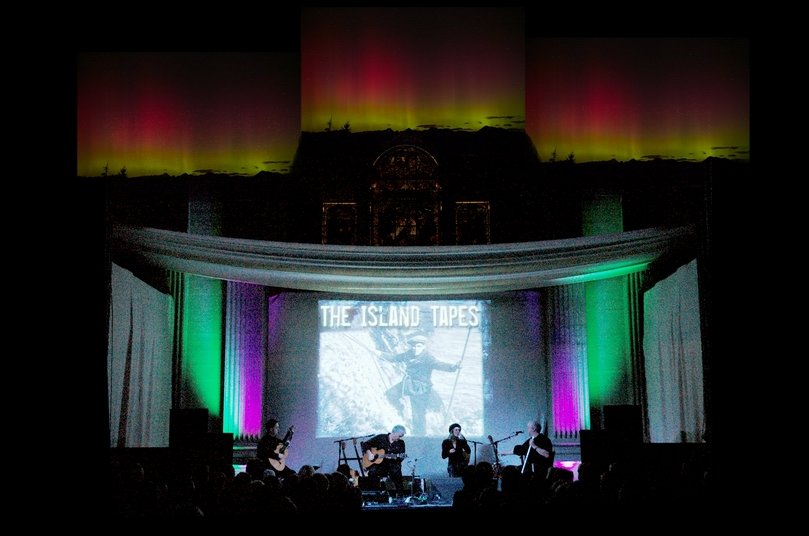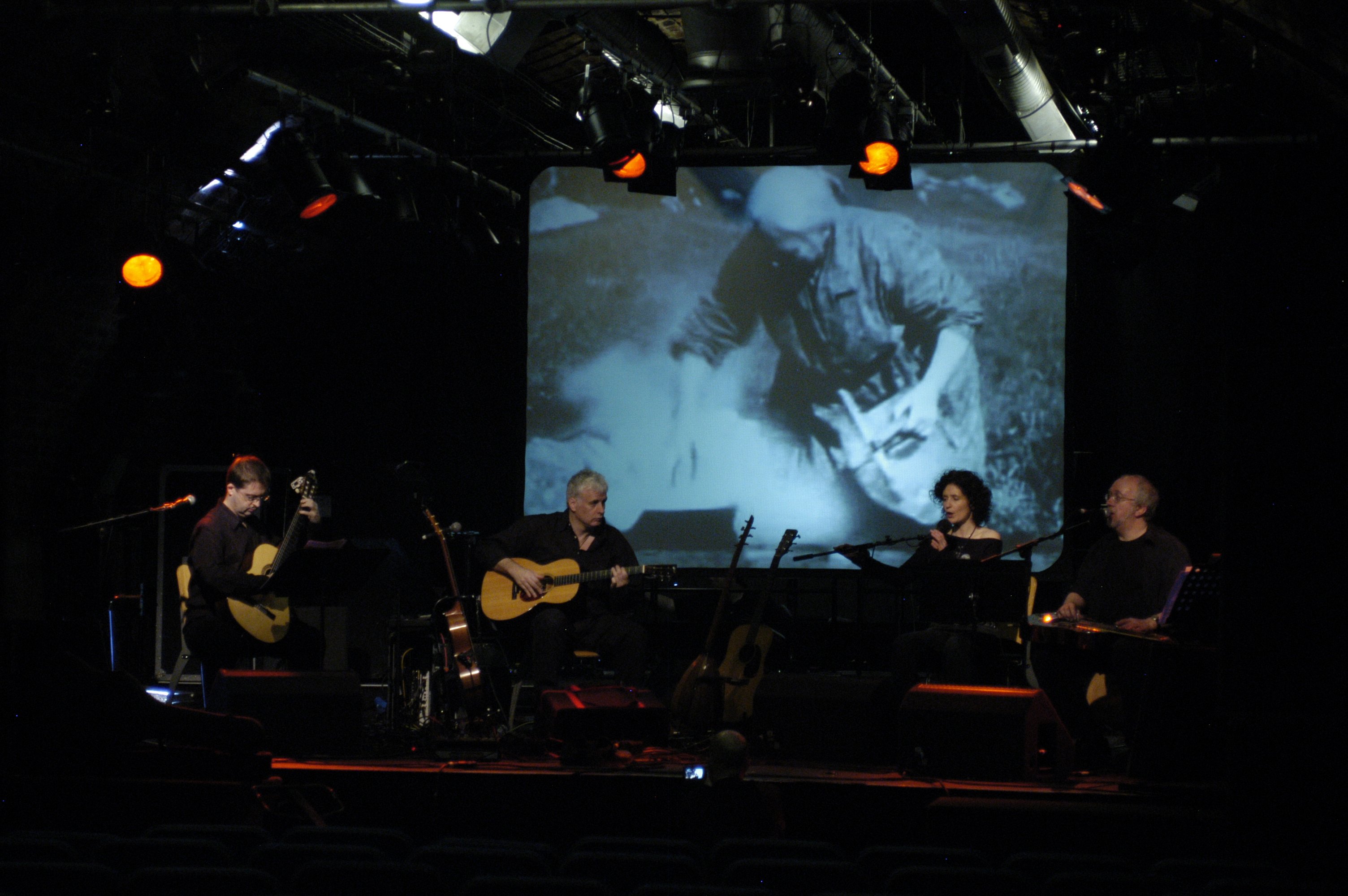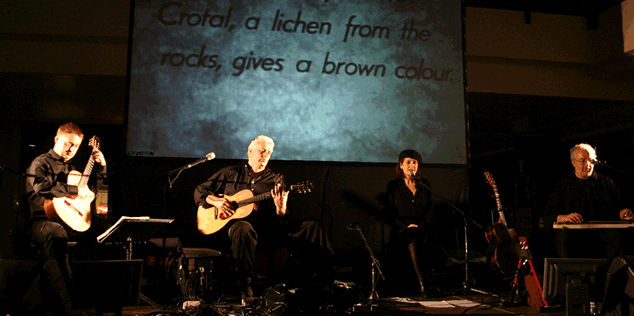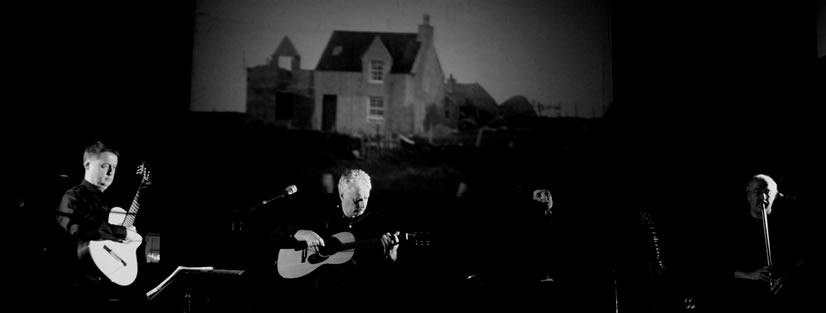Live Reviews

The Times Jan 2006
Robert Dawson Scott
Specially commissioned scores played live to accompany old silent movies has become, if not a commonplace, at least a regular event. Why not, thought guitarist David Allison, do the same with Celtic music, using the rich catalogue of films in the Scottish Screen archive?
Like all the best ideas, it sounds simple but is a lot less simple to execute.
Allison began on his own with one film about St Kilda at last year's West End festival. If you're not familiar with Allison's particular schtick, "on his own" may be misleading. He has developed techniques of electronically looping his own playing while he's playing it, building up complex riffs over which he plays even more complicated tunes until he sounds like an entire band.
Now he has taken the film soundtrack idea and added some more layers to that in the form of two more top-class guitarists, the classically trained Allan Neave and Ian Melrose, the brilliant finger-picker.
Add to that the voice and comely presence of Alyth McCormack and three more films and you have a full 90-minute show, and, it transpires, one of the highest quality, brilliantly executed by top-class performers.
The films come from the Twenties and Thirties and from the Scottish islands (wouldn't "Island Reels" be a better title?); crofting on Skye, holidays on Harris, the Handba' Game from Orkney and a remarkable record of a now largely forgotten craft in Shetland, making a keshie, a kind of heavy-duty basket suitable for carrying home the peats, from the stalks of the harvest.
Each gets a very different but sensitively judged treatment, led by one or other of the players who chose the films they themselves wanted to work on. It's not so much an accompaniment as a response to the images and narratives of the film. The music for the St Kilda film in particular, shot only a couple of years before the islanders were finally evacuated, captures both the archaism of the islanders' lives, like something out of the mid 19th century, and somehow implies the sorrow of the leave-taking that, evidently, will have to come soon.
Of course, there is a strain of nostalgia to the whole performance just as there is in a great deal of traditional music. But for once that seems appropriate and respectful rather than reactionary and backward-looking.
This is an idea which could stand to get bigger still in a more sympathetic venue -the Arches was really not the right place -with a bigger screen, more films and more musicians. One can imagine the North American market, for example, absolutely lapping it up. In the meantime, let's hope it gets shown again here soon.
Hi-Arts Norman Bissell January 2008
Wonderfully grainy archive films of the islands coupled with great guitar work from Ian Melrose and Allan Neave, the expressive Gaelic singing of Alyth McCormack and David Allison’s intricate real-time recording on guitar and percussion made for another memorable Celtic Connections outing for The Island Tapes.From humbler origins in David Allison’s soundtrack to some Scottish Screen Archive films, this project now takes in six films and four outstanding musicians, has toured in Germany, Estonia, France and New York as well as Scotland, and its DVD and CD has sold 2500 copies in the first two weeks since its January release. Compositions by the four musicians along with traditional songs and tunes beautifully complement these old films of Harris, Orkney, Skye, Shetland, St Kilda and an emigrant journey to New York.
The imposing figure of silver-haired David Allison sits like some Hebridean captain at the bridge of his multi-media creation pressing pedals in his stocking feet, mixing and layering pre-recorded flute and fiddle, even playing brushes on the back of his guitar, while evocative island images flicker behind him and the others.
In the course of the night we learn much about the 1930s working lives of the islanders, whether it’s washing clothes in a burn and peat cutting in Harris to Alyth’s sprightly vocals or Da Maakkin O’ A Keshie (a straw basket) by Gideon, a Shetland old timer with drooping moustache and bunnet, to a ukulele and kazoo accompaniment.
In Handba’ at Kirkwall, Orkney, the lovely tune ‘Farewell to Stromness’ by Peter Maxwell Davies quickly trips into ‘Moments in Awe’ from Andrew Robinson as shop windows are boarded up and the annual battle between the Uppies and the Doonies gets underway.
In film terms the prize winning Crofting in Skye by an unknown director is the most dramatic and successful, and you can almost hear the sheep being rescued and a Hebridean storm getting up in the tunes composed by Ian Melrose. The final two films, St Kilda – Britain’s Loneliest Isle and A New Way To A New World, are the most poignant, not just because they show the people of St Kilda only two years before their evacuation and emigrants on the Cameronia bound for New York, but because they include the oral testimonies of Norman Gillies, whose mother’s death in childbirth precipitated the islanders’ decision to leave St Kilda, and of emigrants from the Ellis Island archives.
Norman’s firm voice echoing down the years blots out the colonialist stain of tourists in their fur coats patronising ‘the natives’, while across the Atlantic the Tapes end in New York where ‘the river … just flows on’. A sentiment that must surely apply to this show.
The Courier July 2007
Garry Fraser
Dundee International Guitar Festival 2007
The Dundee Guitar Festival is well known for it musical diversity and the two concerts on Saturday 6th July were complete musical chalk and cheese.
The evening concert came courtesy of The Island Tapes, which featured live guitar and vocal music played to silent films of life in the 20’s and 30’s in St. Kilda, Orkney, Shetland, Harris and Skye. I wasn’t sure if this was my cup of tea but as the evening wore on I was captivated not only by what was on screen but by the music below.
Vocals were by the superb Alyth McCormack, whose voice would sweep the floor at any mod, and festival director Alan Neave performed Hand Ba’ at Orkney with Peter Maxwell Davies’ Farewell to Stromness perfectly apt for the occasion.
There were also excellent contributions from the other members of the quartet on stage, Ian Melrose and David Allison.
Of all the films, it was the St Kilda sequence that was the most impressive, with the voice-over of a former inhabitant describing life before the island was evacuated.
This is a brilliant concept and something that you would certainly want to see again.

The Scotsman January 2006
Jim Gilchrist
Programme music for archive film, or concert with silent movie backdrop? Despite that debatable point, David Allison's project, combining first-rate playing and singing with vintage film of Harris, Skye, Orkney, Shetland and St Kilda, made for an engaging evening.
Guitarist Allison has a distinctive technique - his electronic "live looping", which layers hand percussion, bass lines and riffs into dramatic and shimmering, if occasionally repetitive, music.
More conventional in approach were classical guitarist Allan Neave and the German-based Scots fingerstyle ace Ian Melrose, while Alyth McCormack's fine Gaelic singing was somewhat constrained by the programmatic context.
The films, courtesy of the Scottish Screen Archive, were often artlessly charming, but also poignant in these frozen moments, from the riotous assembly of the Kirkwall Ba' Game to scenes from Hebridean communities poised on the cusp of modernity. Among the musical highlights were Neave's straying into traditional territory with The Banks of the Bann, the dramatic chiming of Melrose's Nomads of the Air, Allison's eastern-tinged tribute to the late Ali Abassi, and a boisterous ensemble ragtime sequence, which saw McCormack displaying hitherto unrevealed kazoo skills.
The finale featured some elegiac footage of the St Kilda community, with McCormack's vocals at last allowed to soar.


